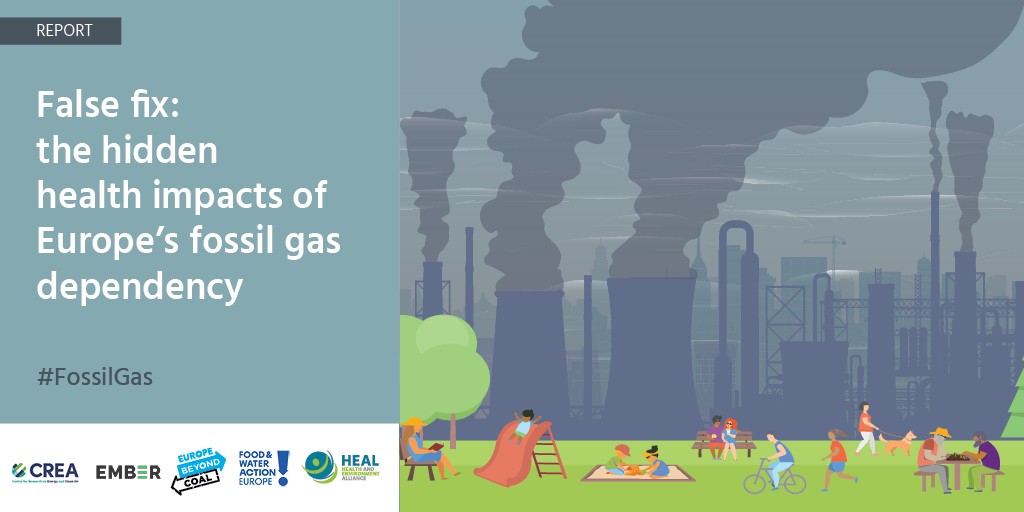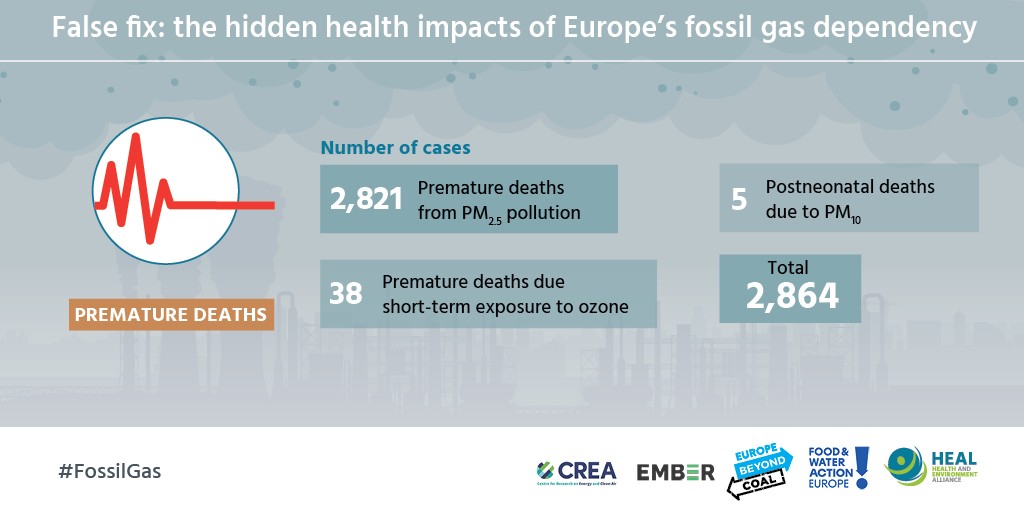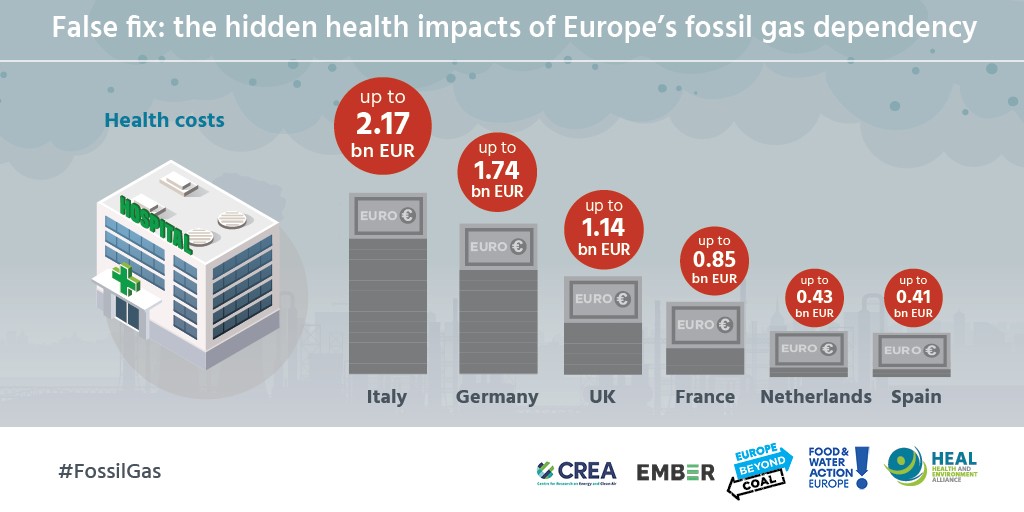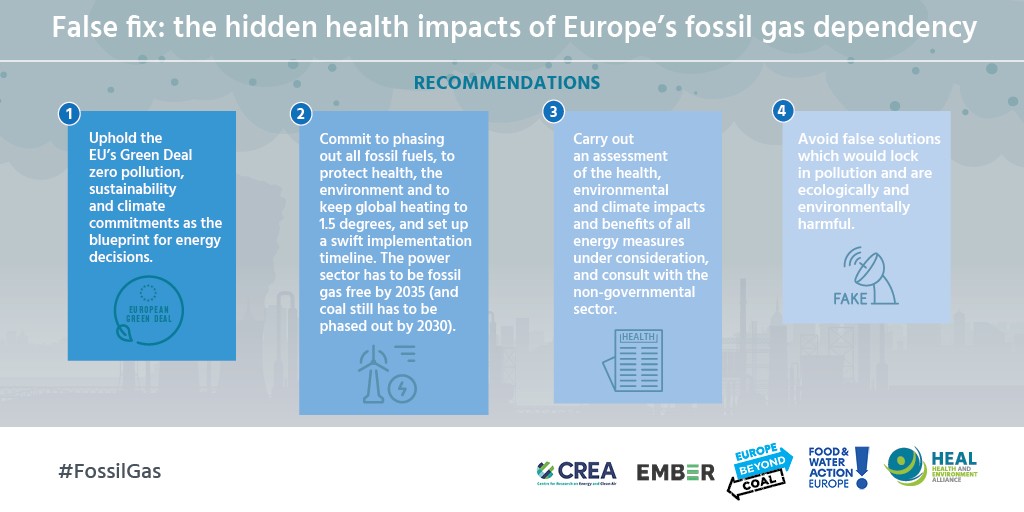The EU’s proposed 2040 climate target to reduce domestic emissions by 90% - while allowing up to 3% to be met through international carbon credits – risks undermining health protections. The Health and Environment Alliance calls on member states to strengthen their climate commitments in order to protect health, rather than delay and weaken overdue action.
First of its kind analysis on the health harm of burning fossil gas shows that in 2019 alone, burning fossil gas for power (and heat) generation caused over 2,800 premature deaths from air pollution (from PM2.5, NO2 and ozone) in the EU-27 and the UK. The price tag for this reliance on fossil gas is up to 8.7 billion EUR in health costs for that year, with the largest health burden falling onto Italy, Germany, the UK, France, the Netherlands and Spain.
As the EU Commission is set to present the REPowerEU package, health, environmental and climate NGOs in the new briefing “False fix: the hidden health impacts of Europe’s fossil gas dependency” warn that burning fossil gas, like other fossil fuels, also poses a significant health risk:
The price tag for the EU’s and UK’s reliance on electricity generation from fossil gas sums up to up to 8.7 billion EUR in health costs in 2019 alone, with the largest health burden in Italy, Germany, the UK, France, the Netherlands and Spain. These costs stem from direct impacts on health from air pollution by gas combustion, including over 2,800 premature deaths, over 15,000 cases of respiratory impacts in adults and children, over 4,100 hospital admissions and over 5 million days in lost productivity because of illness.
NGOs urge for the adoption of a timeline and an ambitious deadline for the phasing out of all fossil fuels, including fossil gas, and the avoidance of false solutions in the process. They stress that a continued reliance on fossil fuels undermines the EU’s zero pollution commitment included in the Green Deal, and accelerates climate change, when alternatives exist.
“While coal power generation is the most polluting form of electricity generation, burning fossil gas is not pollution-free. The health impacts and cost stemming from fossil gas combustion have been grossly underestimated in public and policy discussions, and cannot be neglected. The continued reliance on fossil gas is highly unhealthy, especially because gas power plants are located in densely populated areas, where a large number of people are under threat from air pollution impacts.”
Vlatka Matkovic, Senior Health and Energy Officer at HEAL
“The war and energy crisis have exposed that the EU is not decarbonising fast enough. There is a greater sense of urgency to switch to renewables due to the huge geopolitical, economic and climate risks associated with fossil fuels. The diversification of fossil gas supplies is not a viable solution. The only way to protect EU citizens and mitigate the risks is to end fossil fuel dependence through the accelerated deployment of cleaner, cheaper, homegrown renewables.”
Sarah Brown, Senior Energy & Climate Analyst at EMBER
“EU plans to replace a large part of Russian gas imports with liquefied fossil gas (LNG) will bring harm to communities across the planet. If Europe fails to wean itself off all fossil gas, it is not only failing to protect Europeans’ health. It is complicit in the poisoning of people affected by fracking gas for export, which leads to air and water pollution with chemicals and radioactive substances, causes earthquakes and poses a serious health threat to those impacted by Europe’s unhampered fossil fuels greed.”
Frida Kieninger, Director of EU Affairs at Food & Water Action Europe
“This first-of-a-kind research on gas-fired power generation revealed that the health impacts are much larger than would be expected based on total air pollutant emissions. The idea of gas as a ‘less polluting’ fuel has meant that gas-fired power plants have been built in densely populated and urban areas where air pollutant emissions have exceptionally large health impacts. Conversely, the health and economic benefits of phasing out fossil gas will be very significant”.
Lauri Myllyvirta, co-author of the research and lead analyst at Centre for Research on Energy and Clean Air.
HEAL, ISDE e ReCommon: l’Italia è al primo posto in Europa per gli impatti sulla salute delle centrali elettriche a gas. Gli impianti di Eni i più inquinanti
Il rapporto “False fix: the hidden health impacts of Europe’s fossil gas dependency” (“Una falsa soluzione: gli effetti nascosti sulla salute della dipendenza dai gas fossili in Europa”) lanciato oggi da HEAL, ISDE e ReCommon per la prima volta analizza gli effetti sulla salute della combustione di gas fossili, evidenziando come il rischio sanitario sia molto alto, così come accade per tutti gli altri combustibili fossili.
L’Italia risulta in cima alla lista per quanto riguarda gli impatti sulla salute delle centrali a gas, che oggi coprono la metà del fabbisogno elettrico del Paese. Alla fine del 2021, risultavano proposti 48 nuovi gruppi di generazione elettrica a gas, pari a 18,5 GW di potenza, che si aggiungerebbero ai 41 GW esistenti. Nella lista degli inquinatori che bruciano gas fossile in Italia Enipower, parte del gruppo Eni, controllato per il 30 per cento dallo Stato, è al primo posto. Le centrali di Enipower emettono il 20 per cento delle emissioni di ossidi di azoto di tutto il parco elettrico a gas italiano.
Per citare un altro dato rilevante presente nel rapporto, va rimarcato che nel solo 2019, la combustione di gas fossili per la generazione di energia o calore ha causato nell’UE-27 e nel Regno Unito oltre 2.800 decessi prematuri da inquinamento dell’aria (PM2.5, NO2 e ozono).
Le Ong sono molto preoccupate dalle mosse della Commissione europea, che ha incluso nuove infrastrutture per l’espansione del mercato del gas fossile nel pacchetto REPowerEU, al fine di affrontare la crisi energetica in atto.
La dipendenza dell’UE e del Regno Unito dall’energia generata da gas fossili ha prodotto nel solo 2019 costi sanitari pari a circa 8,7 miliardi di euro, con impatto maggiore a carico di Italia, Germania, Regno Unito, Francia, Paesi Bassi e Spagna. Questi costi sono dovuti a conseguenze dirette sulla salute dell’inquinamento dell’aria originato dalla combustione dei gas, che ha provocato oltre 2.800 decessi prematuri, circa 15mila casi di problemi respiratori in adulti e bambini, oltre 4.100 ricoveri ospedalieri e più di 5 milioni di giorni di produttività persi per malattia.
Le Ong chiedono con urgenza l’adozione di un calendario ambizioso per il completo abbandono di tutti i combustibili fossili, compresi i gas fossili, evitando di affidarsi a false soluzioni che rallenterebbero questo percorso e provocherebbero ulteriori danni. Le Ong sottolineano inoltre che il protrarsi della dipendenza dai gas fossili compromette l’impegno dell’UE per il raggiungimento dell’obiettivo “inquinamento zero”, come previsto dal Green Deal, e accelera il cambiamento climatico anche laddove esistono delle alternative.
Vlatka Matkovic, Senior Health and Energy Officer di HEAL, ha dichiarato: “Sebbene la generazione di energia dal carbone sia la forma maggiormente inquinante di produzione energetica, la combustione di gas fossili non è priva di capacità inquinante. Gli effetti sulla salute e i costi derivanti dalla combustione di gas fossili sono stati enormemente sottostimati nei dibattiti pubblici e politici, ma non possono più essere ignorati. Continuare a dipendere dai gas fossili è nocivo, soprattutto perché le centrali elettriche si trovano in aree densamente popolate, nelle quali una moltitudine di persone viene minacciata dagli effetti dell’inquinamento dell’aria.”
Dr. Agostino Di Ciaula, Presidente Comitato Scientifico ISDE, ha affermato: “Circa 20 anni fa l’Italia ha investito massivamente nella produzione di energia da gas fossile. Il risultato è che questo Paese deve oggi subire, tra gli Stati Europei, i più pesanti costi sanitari generati da questa scelta, che già allora appariva insostenibile. Bruciare gas fossili non è, ora come allora, un’opzione sostenibile: alimenta la crisi climatica e genera enormi conseguenze sanitarie che sarebbero facilmente evitabili. Per questi motivi non può essere considerata una strategia di transizione. Una concreta decarbonizzazione che protegga i cittadini dall’inquinamento atmosferico e rallenti i cambiamenti del clima potrà essere ottenuta solo bandendo completamente qualunque fonte fossile, compreso il gas”.
Antonio Tricarico, campaigner e ricercatore di ReCommon, ha dichiarato: “Il gas non è un combustibile di transizione, come sostiene l’industria fossile, ma un combustibile che fa ammalare e uccide. È inaccettabile che lo Stato italiano sia il principale azionista dell’azienda che inquina di più con le sue centrali a gas, il tutto a discapito della popolazione italiana. Lo Stato prima incassa il 30 per cento dei profitti di Eni e poi si sobbarca il 100 per cento degli impatti sanitari delle centrali del cane a sei zampe. La revisione del Piano Nazionale per l’Energia e il Clima prevista quest’anno dovrebbe mirare ad adottare l’obiettivo di un sistema elettrico libero da fonti fossili entro il 2035 e sollecitare un’ordinata eliminazione del gas entro tale data.”
El primer análisis de este tipo sobre el daño para la salud de la quema de gas natural muestra que solo en 2019, la quema de gas para generar energía –y calor– causó más de 2800 muertes prematuras por contaminación del aire (de PM2,5, NO2 y ozono) en la UE-27 y el Reino Unido. En ese año, el precio de esta dependencia al gas natural ascendió a 8700 millones de euros en costes sanitarios, y la mayor carga sanitaria recayó en Italia, Alemania, el Reino Unido, Francia, los Países Bajos y España.
Mientras la Comisión Europea está a punto de presentar su paquete REPowerEU, las ONG de salud, las medioambientales y las climáticas advierten, en el informe “False fix: the hidden health impacts of Europe ‘s fossil gas dependency (“Falsas soluciones: los efectos ocultos sobre la salud de la dependencia de gas natural en Europa”), que la quema de gas natural, al igual que la quema de otros combustibles fósiles, también plantea un riesgo significativo para la salud.
Solo en 2019, el precio de la dependencia de la UE y del Reino Unido por la generación de energía a partir del gas natural ascendió a 8700 millones de euros en costes sanitarios, con la mayor carga sanitaria afrontada por Italia, Alemania, el Reino Unido, Francia, los Países Bajos y España. Estos costes se derivan de los efectos directos en la salud que tiene la contaminación del aire causada por la combustión de gases, incluidas 2800 muertes prematuras, más de 15 000 casos de problemas respiratorios en la población adulta e infantil, más de 4100 ingresos hospitalarios y más de 5 millones de días de productividad perdidos debido a enfermedades.
Las ONG instan a la adopción de un calendario y un plazo ambicioso para la eliminación gradual de todos los combustibles fósiles, incluido el gas natural, y a evitar soluciones falsas durante este proceso. Ellas destacan que la continua dependencia de los combustibles fósiles socava el compromiso de contaminación cero de la Unión Europea, incluido en el Pacto Verde, y acelera el cambio climático, aunque hay alternativas.
Vlatka Matkovic, Senior Health and Energy Policy Officer en HEAL: “Si bien generar energía con carbón es la forma más contaminante de generar electricidad, la quema de gas fósil también contamina. Los efectos para la salud y el coste derivados de la combustión de gas fósil se han infravalorado enormemente en conversaciones públicas y políticas, y no se pueden pasar por alto. Depender de forma continuada del gas fósil es muy poco saludable, sobre todo porque las centrales eléctricas de gas se encuentran en zonas densamente pobladas, en las que una gran cantidad de gente se ve amenazada por los efectos de la contaminación atmosférica.”
Pressemitteilung
Zum ersten Mal analysiert ein Bericht die gesundheitlichen Schäden durch die Verbrennung fossiler Gase, und zeigt, dass allein 2019 die Verbrennung fossiler Gase zur Strom- (und Wärme-)Erzeugung in den EU-27-Staaten und im Vereinigten Königreich über 2.800 vorzeitige Todesfälle durch Luftverschmutzung (durch PM2,5, NO2 und Ozon) verursacht hat. Der Preis für diese Abhängigkeit von fossilem Gas beläuft sich für dqsselbe Jahr auf bis zu 8,7 Milliarden EUR an Gesundheitskosten, wobei die größte Gesundheitsbelastung auf Italien, Deutschland, das Vereinigte Königreich, Frankreich, die Niederlande und Spanien fällt.
Im neuen Briefing “False fix: the hidden health impacts of Europe’s fossil gas dependency“ warnen Gesundheits-, Umwelt- und Klima-NGOs davor, dass die Verbrennung fossiler Gase, ebenso wie andere fossile Brennstoffe, ein erhebliches Gesundheitsrisiko darstellt:
Der Preis für die Abhängigkeit der EU und des Vereinigten Königreichs von der Stromerzeugung aus fossilem Gas beläuft sich allein im Jahr 2019 auf bis zu 8,7 Milliarden EUR an Gesundheitskosten, wobei die größte Gesundheitsbelastung in Italien, Deutschland, dem Vereinigten Königreich, Frankreich, den Niederlanden und Spanien zu verzeichnen ist. Diese Kosten resultieren aus direkten Gesundheitsauswirkungen durch Luftverschmutzung verursacht durch Gasverbrennung, und schlieβen unter anderem 2.864 vorzeitige Todesfälle, über 15.000 Fälle von Atemwegserkrankungen bei Erwachsenen und Kindern, über 4.100 Krankenhauseinweisungen und mehr als 5 Millionen Tage Produktivitätsverlust aufgrund von Krankheiten ein.
Die NGOs drängen auf die Annahme eines Zeitplans und einer ehrgeizigen Frist für die schrittweise Einstellung aller fossilen Brennstoffe, einschließlich fossiler Gase, und die Vermeidung von Sackgassen im Verlauf. Eine weitere Abhängigkeit von fossilen Brennstoffen untergräbt die im Green Deal enthaltene Verpflichtung der EU zur Vermeidung von Umweltverschmutzung und beschleunigt den Klimawandel, obwohl es Alternativen gibt.
“Während die Stromerzeugung aus Kohle die umweltschädlichste Form der Stromerzeugung ist, ist die Verbrennung fossiler Gase nicht umweltfreundlich. Die gesundheitlichen Auswirkungen und Kosten der Verbrennung fossiler Gase wurden in öffentlichen und politischen Diskussionen grob unterschätzt und dürfen nicht vernachlässigt werden. Die anhaltende Abhängigkeit von fossilen Gasen ist äußerst ungesund, zumal sich Gaskraftwerke in dicht besiedelten Gebieten befinden, in denen eine große Anzahl von Menschen durch die Auswirkungen der Luftverschmutzung bedroht ist.“
Vlatka Matkovic, Senior Health and Energy Officer bei HEAL






